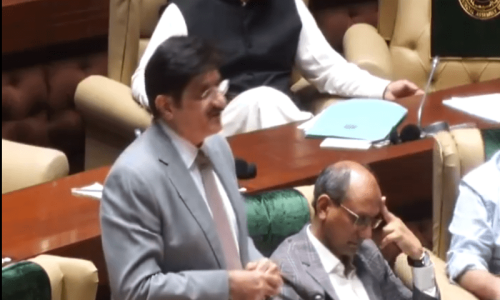KARACHI: The country faces a serious doctors’ shortage mainly due to the fact that over half of graduating medical students don’t practise at all, an extremely discouraging trend and a sheer waste of public money and talent.
This was stated by Jinnah Sindh Medical University (JSMU) Vice Chancellor Prof S.M. Tari Rafi at the second convocation held on Monday at a local hotel.
A total of 525 graduating students of medicine and allied health sciences received degrees in the convocation.
Motivating students that they must not let their hard work go waste, the VC said: “Don’t sit at home and waste your skills. The county needs you.”
Explaining his point further, he said that almost 80 per cent of students who were admitted to country’s medical colleges on merit these days were girls. Unfortunately, however, over half of them did not practice at all once they received their degrees, mainly because they got married and were not allowed by their in-laws to work. Girls often refused to do night shifts or practice in remote areas, he added.
Varsity’s VC says more than half of medical graduates don’t practise
“It’s a huge waste of public money and talent as these girls are chosen purely on merit,” he said, adding that the Sindh government spent an amount of Rs3 million on each medical student in five years.
Prof Rafi requested the government to transfer the building of government medical college in Korangi to JSMU to start a boys’ medical college, which would help meet doctors’ shortage.
Sindh govt cuts varsity’s grant He also took the opportunity to highlight university’s long-standing problems including its financial crisis and said: “The university’s grant from the Sindh government last year was Rs237 million, which now has been reduced to Rs27m. This has put the university in a very precarious position financially, as you know that the budget for the coming year is made on the assumption that the last year’s grant amount will remain the same.”
He urged the government to provide the university space in the the Hawkesby scheme for immediate expansion and allot a larger piece of land in the Education City, where the university had been allotted 20 acres.
This expansion, he argued, was necessary to provide classrooms, training facilities and administrative offices for growing JSMU, currently standing as the second largest medical university Pakistan in terms of student enrolment which exceeded 7,000.
On university’s human resource needs, he requested that the government allowed public sector universities to hire qualified personnel above 60 years of age in areas where qualified people of younger age group were not available.
He also referred to another issue the JSMU was facing since in its establishment and called upon the government to create regular teaching posts for the university.
“I request the government to transfer all faculty positions from Jinnah Postgraduate Medical Centre and the National Institute of Child Health to the JSMU. At present, 98pc of the JPMC faculty and 95pc of the NICH faculty is already on the university’s payroll.
“This step will not only ensure smooth functioning of the leading medical institution but will also promote sustained growth of the university as a modern and credible institution in the public sector that the government of Sindh can truly be proud of.”
He also briefed the audience about the university’s progress and upcoming programmes.
Speaking as the chief guest, Mines and Minerals Minister Mir Shabbir Ali Bajarani congratulated students, their parents and JSMU faculty members and said that the government wanted to create an environment conducive to promoting health and public welfare.
“The government places special emphasis on health, education and development. These elements form the very crux of a productive society. Investing in health is the ground for all economic and social activity,” he said.
He appreciated JSMU’s engagement in healthcare in Thar and said that the government was committed to provide infrastructure and support in remote areas.
“With the help and support of trusted educational institutions like Jinnah Sindh Medical University, I am sure we will be able to achieve our vision and mission to create a healthy and educated environment,” he said.
A total of 15 gold medals were given to top students in MBBS, Pharm D, Master of Science in Public Health and MBA in hospital and healthcare management.
They included S. Roshan Ahmed Naqi, Manadiya Fatima, Lamia Zubair, M Usman Haider, Paras Yousuf, Sania Mahar, Tooba Farhat, Rameen Majeed, Mehwish Hanif, M.Usama Haider, Shehrish Khan, Salima Arif, Fatima Ali Khan and Sania Arshad.
The award for the Best Teacher 2018 went to S. Tafazzul Hyder Zaidi.
Published in Dawn, January 1st, 2019














































Dear visitor, the comments section is undergoing an overhaul and will return soon.